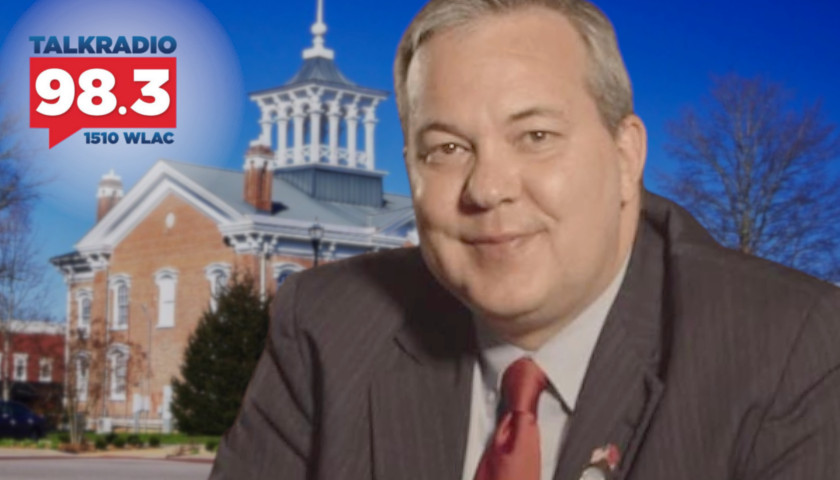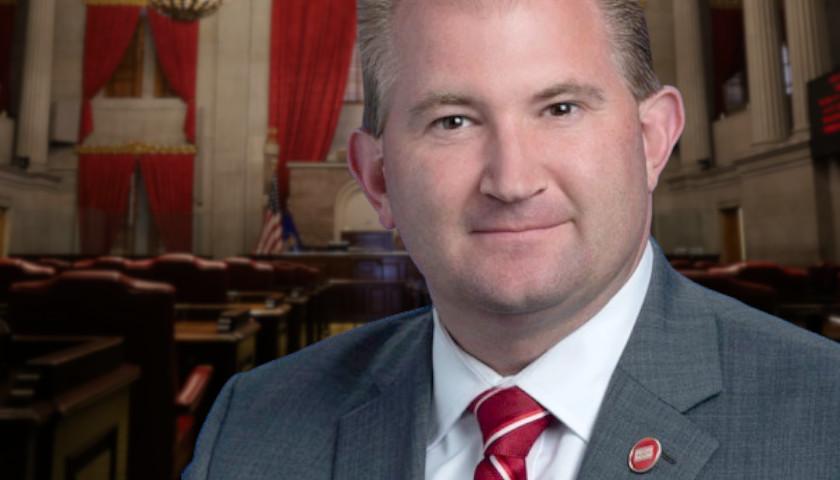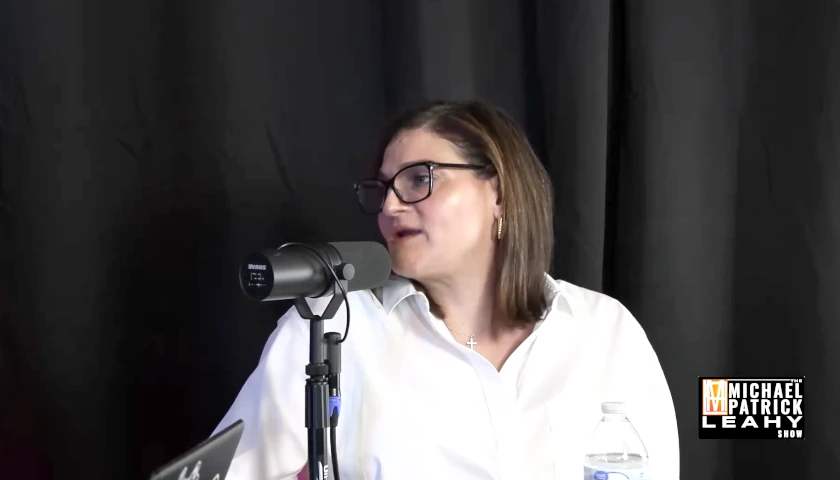Live from Music Row, Thursday morning on The Tennessee Star Report with Michael Patrick Leahy – broadcast on Nashville’s Talk Radio 98.3 and 1510 WLAC weekdays from 5:00 a.m. to 8:00 a.m. – host Leahy welcomed the newly elected mayor of Coffee County, Tennessee, Judd Matheny, to the newsmaker line to talk about the county’s growth and how he intends to manage it.
Leahy: We are joined now on our newsmaker line by our very good friend, the new mayor of Coffee County here in Tennessee, Mr. Judd Matheny. Good morning, Judd.
Matheny: Hello, Michael. How are you, man? Great to be on the air with you.
Leahy: And, of course, our listeners know you, Judd, as one of the most conservative members of the Tennessee General Assembly. You served for many years as a state representative – 16 years.
Matheny: I did. I was privileged for 16 years, Michael, to serve my community.
Leahy: And you led many conservative charges there. And now, since September 1, you’ve been mayor of Coffee County. Now, just for our listeners, Coffee County is 50,000 people. Tell our listeners – who, perhaps maybe some of them are new to Middle Tennessee – how do you get to Coffee County?
Matheny: We’re actually a little over 59,000 people with the new census. We’re growing at a good clip. And Coffee County is located about equidistant between Nashville and Chattanooga, right on I-24, just south of Rutherford County. We border up with Rutherford County and are looking at some of the same growth pressures that they’ve seen in the past.
Simon: Is Jack Daniel’s in Coffee County?
Matheny: No, sir, it is in Moore County, which is right next to us. We have George Dickel, though, in Coffee County.
Simon: Because, somebody ought to get slapped on the wrist, because Jack Daniel’s has gone Woke now.
Matheny: Everything’s changing.
Leahy: Well, there’s the point, isn’t it, Judd? Everything is changing. And there are big changes in Coffee County, which the cities there, Manchester and Tullahoma, used to be largely rural. Now it seems to me it’s growing like crazy.
I’m hearing reports of people from California and other points coming in with lots of money buying up estates, farm estates, if you will, changing the structure on the economics of local agriculture. What are the growth problems that you’re seeing right now in Coffee County?
Matheny: Yes. What you have said is absolutely correct, and we’re in that phase now of being used to being mostly a rural, kind of agrarian-type county, to about a 50/50 split of new residences coming in, new industries coming in, and trying to strike that balance to make sure that our farmlands and the rivers and lakes that we have here continue to be pristine and be beautiful.
And, of course, we’ve got to update a lot of apparatus within our county like zoning and urban growth boundaries, and planned growth areas and things of that nature. And infrastructure in our county is going to have to increase at a pretty rapid pace.
So I’ve been really trying to mobilize individuals within this county to the need to do that and consolidate the various strategic plans and economic development plans that various cities in the county have into a more cohesive plan.
And it’s such a great task, but everybody is on board with it and understands the need for it. If we’re going to have coordinated, predictable growth, and we don’t end up with so many unplanned neighborhoods and so many scattered businesses around and no good corridors for roads or utilities or anything of that nature that we have to pay for dearly later.
So we have an opportunity to get out in front of these things. The centrifugal force is definitely increasing, and we’re trying to keep up with it. And I have every confidence that we’re going to be able to. It’s just going to be all-hands-on-deck for the foreseeable future.
There are a lot of people coming in here. Manchester and the surrounding areas are growing very quickly. Tullahoma remains somewhat stagnant in its population, but Manchester is growing very quickly.
Simon: How are your schools? I know Williamson has had a lot of big battles over the schools and what’s being taught. How are things there?
Matheny: There’s a lot of pressure on our schools, for headroom for the new students that are coming in. We have three systems in Coffee County. We have Manchester City, which goes through middle school. We have Tullahoma City, which goes through high school, and Coffee County, which goes through high school.
And I believe that we have a generally very conservative curriculum here, and we’ve got some fantastic teachers. In fact, my chief of staff is a retired teacher from Tullahoma City Schools. We’ve got good representation there, and he’s very conservative, a retired naval officer.
I feel that we are in a very good place. Years ago, the general assembly looked at textbooks and curriculum, and I believe the hard work that was done has created a much more comfortable curriculum with the parents here than in the past.
There’s always going to be work to do with textbooks and curriculum and making sure that we prioritize the time we have in the classroom. So we’ll watch that very closely. But I feel very good and very proud of my folks down here. They’ve supported me through thick and thin, and I’ll do the same with them.
Leahy: Is there tension between the newcomers from California and other places, and residents who have been there their whole lifetime?
Matheny: Not so much. There is sometimes, because there are different expectations that people have when they come from other parts of the country to live here. And most of them, though, are pleased that they have the additional freedoms that they have.
Less government regulation with regards to being able to build on a piece of property or locate near a waterway or something such as a navigable stream. It’s much easier here for them.
But of course, we have that dynamic. I think it’s going on in a lot of parts of the state where affordable housing here is a real issue because of the disposable income people have brought from other parts of the country, and being able to pay cash.
Real estate prices have gone up very high and because of this, we have a lot of new residential development, and a lot of it is just moving very quickly, and we need to make sure that it’s planned out properly and we have the utilities infrastructure in place to provide for those and keep up with it.
It’s a real challenge. The cities are struggling with it, and we’re beginning to struggle with it, and it’s only going to grow. We see it coming seriously.
The state has a lot of economic opportunities that they’re working on bringing it to Coffee County as well as our industrial board and our director are always chasing leads and having some groundbreakings …
Leahy: Has Coffee County become to some extent a bedroom community, where people commute to Nashville or is it people just settling down in Coffee County?
Matheny: It’s a mixture of both. We think based on the data we’ve gathered, we’ve got around 6,000 people that leave this county every day to go to work. That’s in Huntsville, Nashville, Murfreesboro, McMinnville; Bridgestone and large corporations.
So yes, there’s a lot of people that live here and go to other places to work. But there are also a lot of people that are moving here and taking jobs here in some of our larger manufacturing industries, the air force base and enjoying more available land, better public schools, and just a better quality of life.
Listen to today’s show highlights, including this interview:
– – –
Tune in weekdays from 5:00 – 8:00 a.m. to The Tennessee Star Report with Michael Patrick Leahy on Talk Radio 98.3 FM WLAC 1510. Listen online at iHeart Radio.
Photo “Judd Matheny” by Judd Matheny. Background Photo “Coffee County Courthouse” by Brian Stansberry. CC BY 4.0.





